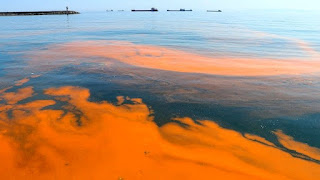Can a harbour get lost? Can you misplace an entire sea?
The Sea of Marmara connects the Black Sea to the north with the Mediterranean to the south. It has a two-layer current system made up of these compositionally very different bodies of water, flowing to and fro in opposite directions. As less salty, nutrient-rich Black Sea water flows through the Bosphorus – the channel through Istanbul that separates Europe from Asia - it meets the saline, nutrient deficient Mediterranean water in the Sea of Marmara. According to marine scientists, the coexistence of these waters - two currents stacked on top of each other – creates a unique and nutrient rich environment.
For centuries this unique marine ecosystem has been home to a multitude of species of fish, dolphins, crustaceans, mollusks, and corals. Not anymore.
Since the 1970s, the coasts around the Sea of Marmara has seen rapid industrialization and urbanization which resulted in intense pollution. The Sea of Marmara has been slowly filling up with polluted wastewater. Most recently, in late 2020, wastewater from the nearby Ergene River, one of the world’s most polluted rivers, also started to be discharged into the Sea of Marmara, channelled through a 59 kilometer-long pipe out into the open sea. When the local municipality in the city of Edirne studied the water, they found excessive levels of pollutants, including cyanide, nitrogen, chromium, lead, and copper.
Toxic wastewater from factories along the Sea of Marmara’s coast is also discharged into the sea. In addition to this, waste from large ships, excessive fishing, and extensive land reclamation projects using land fill along its coasts have added to the Sea of Marmara’s burden. As a result, the Sea of Marmara has seen frequent episodes of red tide and enormous blooms in green algae.
In the summer of 2021, an unexpected explosion of mucilage, a thick substance produced by algae that has earned the nickname 'sea snot', led to the death of thousands of sea creatures. Triggered by warming temperatures and excessive levels of nitrogen and phosphorus in the sea, the mucilage acted as a blanket on the shores. It prevented oxygen and sunlight from entering the water, clogged the gills of fish, and killed thousands of spawning fish, crabs, and stingrays.
The plan to create a new waterway linking the Black Sea and the Sea of Marmara will further disrupt the delicate ecological balance between them and put Turkey’s freshwater resources at risk.
Levent Artüz, a hydrologist, says that the Sea of Marmara has hit “rock bottom.” He says that the mucilage crisis, caused by the unusually rapid proliferation of microscopic phytoplankton, is just another symptom of an ecosystem that is currently wildly imbalanced. Artüz makes the dramatic claim that the Sea of Marmara has already died, and now exists as a lifeless body of water.


No comments:
Post a Comment